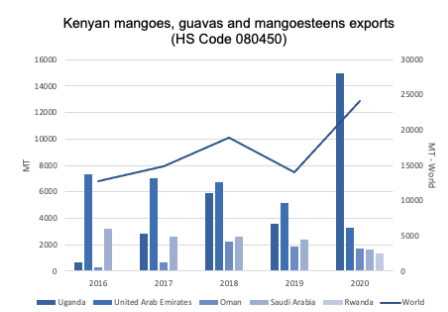Kenya is approved to export mangoes to the EU from September
Kenya is ranked as the 13th global producer of mangoes, guavas, and mangosteens (HS Code 080450) with 867.9 thousand MT produced and in 2019. In the same year, it was also the 16th exporter of HS Code 080450 with 14 thousand MT of exported volume. In 2020, the exports grew 71.8% in volume, with the main increase from Uganda, which had an increase of 316.9% compared to the previous year. As a result, Uganda became the biggest importer of Kenyan mangoes, guavas, and mangosteens, followed by the Emirates, Oman, Saudi Arabia, and Rwanda. The main varieties of mangoes produced in Kenya are Tommy Atkins, Kent, Apple, and Ngowe. The harvesting peak runs from November and March, which is the off-season of main global mango producers (China and India), becoming an option to mango buyers.

Source: Tridge, ITC
In 2014, the Kenyan government imposed a self-ban on the exports of mangoes to the EU, due to several cases of fruit flies between 2010 and 2014. The measure was taken to protect the Kenyan mango reputation and to control this pest before resuming exports. And from September 2021, the Kenyan mangoes were initially scheduled to go back to the EU. The EU has approved the entrance of Kenyan mangoes after tests found no traces of fruit flies larvae in the samples.
Moreover, the Kenya Plant Health Inspectorate Service (Kephis) is developing a certification protocol to ensure zero pests levels in exports cargoes to ensure the EU buyers that the fruit flies are no longer an issue. The protocols will include a certification recognizing that the fruits are from a fruit fly-free zone, which is the production area free from fruit flies since the last vegetation cycle. The inspections shall also be conducted three months prior to the start of the harvest and also monthly during the harvesting period to keep the certification. Currently, there are two pest-free zones in Kenya: Makueni and Elgeyo Marakwet counties which are able to start exporting to the EU in September. Makueni county is the biggest mango production area in Kenya representing 31% of Kenyan mango production.
The Kenyan mango industry is also building a partnership program with the partnership with the US Agency for International Development to fund hot water treatment facilities that will eradicate the fruit flies before exports.
The entity also estimates that the resume of exports of mangoes to the EU will help bring revenues of up to Sh 10 billion (USD 92 million) per year.
Sources:
- Coleacp. “Kenya mango farmers hope to resume lucrative European markets in September”
- CBI. “Market Potential”
- Fresh Fruit Portal. “Kenya to resume mango exports to Europe after eight years”
- FreshPlaza. “Hope for Kenyan mango farmers as exports to Europe resume”
- Kenya Wall Street. “Kenya acts to lift mango exports ban”
- Kenya Wall Street. “Kenya mangoes to re-enter EU in September”
- Standard Media. “Kenya missing out on billions after export ban over fruit fly”



